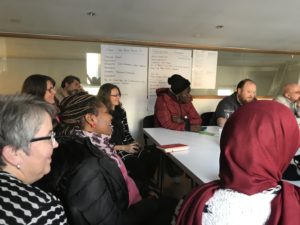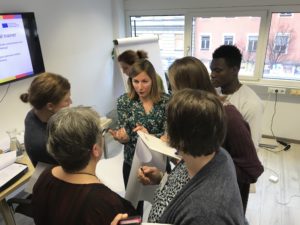 The third newsletter presents the blended learning programme consisting of national workshops in each partner country, e-learning modules, and the piloting phase. The e-learning course aims to introduce our concept and to support adult educators to plan, deliver and evaluate innovative integration learning activities and eventually to validate the integration competences developed in these learning offers. Please download the newsletter here.
The third newsletter presents the blended learning programme consisting of national workshops in each partner country, e-learning modules, and the piloting phase. The e-learning course aims to introduce our concept and to support adult educators to plan, deliver and evaluate innovative integration learning activities and eventually to validate the integration competences developed in these learning offers. Please download the newsletter here.
Month: November 2018
 The VIC blended learning course is now available. It consists of: national workshops in each partner country, e-learning modules, and piloting phase. The e-learning course aims to introduce our concept and to support adult educators to plan, deliver and evaluate innovative integration learning activities and eventually to validate the integration competences developed in these learning offers.
The VIC blended learning course is now available. It consists of: national workshops in each partner country, e-learning modules, and piloting phase. The e-learning course aims to introduce our concept and to support adult educators to plan, deliver and evaluate innovative integration learning activities and eventually to validate the integration competences developed in these learning offers.
The four learning modules provide a combination of theoretical input, learning activities and a variety of examples and practical tips on how to implement the VIC-approach in the daily work with your learners.
If you are interested to take part in the blended learning course, please don’t hesitate to contact one of the partner institutions
 The German partners, DVV and BUPNET, were invited to provide a workshop in the framework of the conference entitled Angekommen in Deutschland – was nun? (please find the documentation in German here) organised by the German NA.
The German partners, DVV and BUPNET, were invited to provide a workshop in the framework of the conference entitled Angekommen in Deutschland – was nun? (please find the documentation in German here) organised by the German NA.
After a short introduction into the project, Sabine and Beater presented the concept of “integration” and the different competencies associated with it. The aim is to evaluate and visualise these competences using the LEVEL5 validation system. This has already been developed in various previous projects. The participants were given an overview of the LEVEL5 reference system and its application in the VIC project. Then all participants were given the task to firstly assess themselves in terms of their knowledge, skills and attitudes using the reference system for the competence “Intercultural Communication”. This self-assessment was then jointly evaluated and discussed – with the participants finally agreeing that a well-founded self-assessment is indeed difficult, but at the same time helpful and valuable.

